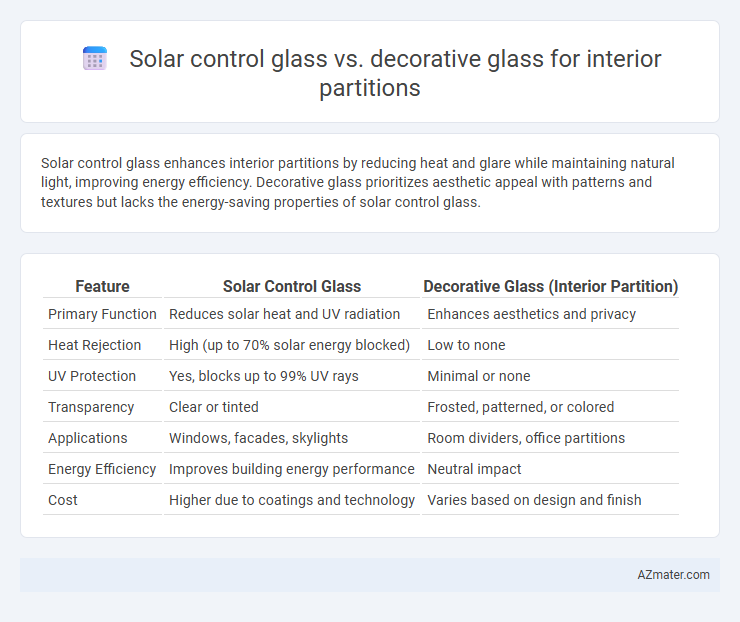Solar control glass enhances interior partitions by reducing heat and glare while maintaining natural light, improving energy efficiency. Decorative glass prioritizes aesthetic appeal with patterns and textures but lacks the energy-saving properties of solar control glass.
Table of Comparison
| Feature | Solar Control Glass | Decorative Glass (Interior Partition) |
|---|---|---|
| Primary Function | Reduces solar heat and UV radiation | Enhances aesthetics and privacy |
| Heat Rejection | High (up to 70% solar energy blocked) | Low to none |
| UV Protection | Yes, blocks up to 99% UV rays | Minimal or none |
| Transparency | Clear or tinted | Frosted, patterned, or colored |
| Applications | Windows, facades, skylights | Room dividers, office partitions |
| Energy Efficiency | Improves building energy performance | Neutral impact |
| Cost | Higher due to coatings and technology | Varies based on design and finish |
Introduction to Interior Partition Glass Solutions
Solar control glass for interior partitions reduces heat transfer and glare, enhancing energy efficiency and occupant comfort in office and commercial spaces. Decorative glass offers a wide range of designs, textures, and patterns, providing aesthetic appeal and privacy while allowing natural light to flow through. Both options serve as functional and stylish solutions, with solar control glass focusing on performance and decorative glass emphasizing visual impact.
What is Solar Control Glass?
Solar control glass is designed with special coatings or tints that reduce heat gain by reflecting and absorbing solar radiation, enhancing energy efficiency in interior partitions. It minimizes glare and UV penetration while maintaining natural light transmission, making it ideal for temperature regulation and comfort in office or commercial spaces. Decorative glass prioritizes aesthetic appeal with patterns or textures, offering less thermal control compared to solar control glass in interior partition applications.
What is Decorative Glass?
Decorative glass is designed to enhance interior partitions by adding aesthetic appeal through patterns, textures, and colors while maintaining privacy and light diffusion. Unlike solar control glass, which primarily focuses on reducing heat and glare, decorative glass elevates the visual impact of interior spaces without compromising natural light. Common types include frosted, etched, stained, and laminated glass, all tailored to combine functionality with artistic expression.
Key Features of Solar Control Glass for Interiors
Solar control glass for interior partitions features advanced coatings that significantly reduce solar heat gain while maintaining high visible light transmission, enhancing energy efficiency and occupant comfort. It effectively minimizes glare and UV radiation, protecting interiors from fading and overheating. Unlike decorative glass, solar control glass prioritizes thermal performance and sustainability without compromising aesthetic appeal.
Aesthetic Benefits of Decorative Glass in Partitions
Decorative glass offers superior aesthetic benefits in interior partitions by providing customizable designs, textures, and colors that enhance visual appeal and complement diverse interior styles. Unlike solar control glass, which primarily focuses on energy efficiency and glare reduction, decorative glass transforms spaces with artistic patterns and frosted or stained effects that add character and privacy. This versatility allows designers to create unique, elegant partitions that serve both functional and decorative purposes, elevating the overall ambiance of interiors.
Energy Efficiency: Solar Control vs Decorative Glass
Solar control glass significantly enhances energy efficiency by reducing solar heat gain, thereby lowering cooling costs and improving indoor comfort in interior partitions. Decorative glass primarily serves aesthetic purposes and lacks specialized coatings to block infrared and ultraviolet rays, resulting in minimal impact on energy savings. Choosing solar control glass for interior partitions optimizes natural light utilization while maintaining thermal regulation, making it superior for energy-efficient building design.
Privacy and Light Control: Comparative Analysis
Solar control glass offers superior light control by filtering harmful UV rays and reducing glare, making it ideal for maintaining natural brightness while enhancing energy efficiency in interior partitions. Decorative glass prioritizes privacy through patterns, textures, or frosting but may allow more light diffusion, affecting clear visibility and brightness levels. Choosing between the two depends on the balance required between privacy needs and light management in specific interior design applications.
Cost Comparison: Solar Control Glass vs Decorative Glass
Solar control glass typically costs 20-30% more than decorative glass due to its advanced coatings that reduce heat transmission and enhance energy efficiency in interior partitions. Decorative glass offers a wider range of styles and finishes at a lower price point but lacks the functional benefits of solar control properties. Choosing between the two depends on budget priorities and performance needs, with solar control glass providing long-term energy savings despite the higher initial investment.
Durability and Maintenance Considerations
Solar control glass offers superior durability with its specialized coatings designed to resist UV rays, reducing fading and material degradation over time, which makes it low-maintenance and ideal for long-term interior partitions. Decorative glass, while aesthetically versatile with patterns and textures, often requires more frequent cleaning and may be more susceptible to scratches or wear depending on the finish applied. Choosing solar control glass enhances energy efficiency and longevity, whereas decorative glass prioritizes visual appeal but may entail higher upkeep to maintain pristine condition.
Choosing the Right Glass for Your Interior Partition
Solar control glass offers superior energy efficiency by reducing heat gain and minimizing glare, making it ideal for interior partitions in spaces with high sunlight exposure. Decorative glass provides aesthetic versatility with options like frosted, textured, or colored finishes, enhancing privacy and design without compromising light transmission. Selecting the right glass depends on balancing energy performance needs with desired visual appeal and privacy requirements in your interior space.

Infographic: Solar control glass vs Decorative glass for Interior partition
 azmater.com
azmater.com